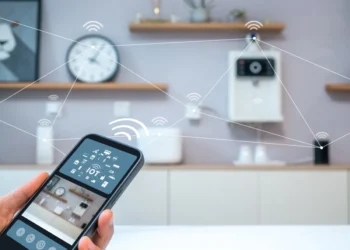Your home wifi router is the central hub for all internet traffic coming from your devices. Thus, internet service providers can track everything you do…if they want to.
And while they don’t track all the websites you visit, they do collect data. Some ISPs even sell it.
Since it’s not easy to read through thousands of words of policies, this blog post will sum up everything you need to know about wifi router privacy.
How Do Router Companies Collect Data?
For two devices to exchange information online, they must acknowledge each other via their IP address. Your IP address is a unique number assigned to your device, and it can provide information such as browsing history and geolocation.
Each time you visit a website, your network sends your IP address and port number to the server hosting the website. The server uses this information to route the website’s content to you.
But, the website host isn’t the only entity that logs your IP address as a visitor. Your internet service provider (ISP) does too.
What do they do with it?
There are two main ways ISPs use their user’s data:
1. Marketing
IP address tracking for marketing is mainly limited to tracking location data. ISPs provide that data to website owners to gain insights into their visitors. For example, if you visit a national movie theater chain, the website will use your location to show you the closest theaters.
Depending on whether the website uses cookies (many websites do,) it may also tell whether you’re visiting the website for the first time and the pages you’re visiting. Beyond that, no personal information will be shared.
2. Identifying illegal activity
IP address tracking is also the most common way to identify illegal online activity. Internet piracy is still very common, not because it’s difficult to trace, but because it’s leniently enforced. Content owners may be able to identify the IP addresses of devices that are downloading their content illegally.
More serious online crimes can also be detected with IP address tracking. Devices behind scams and phishing emails can be traced. But, since most ISPs have a dynamic IP address (they change over time), most scammers get away with it.
For even more serious crimes, like selling illegal substances online, law enforcement can get involved and demand the ISP to identify the person behind the IP address.
How to improve your privacy
Even though your personal data is safe, some people may not like that their internet activity can be traced back to them. So, here are a few ways to improve online privacy:
VPN
A Virtual Private Network (VPN) is the ultimate tool to hide your online activity. A VPN is a paid service that will mask your IP address and encrypt all communication between your device and the internet.
A VPN detours internet traffic from your device through a third-party server and then communicates with the website you’re trying to visit. This way, websites (or other IP addresses you interact with) won’t get your actual IP address.
The VPN is excellent for security and is also practical for accessing geo-blocked content on websites and services.
Also read these 6 Home Security Mistakes You Might Be Guilty Of Making
Free proxy server
If you don’t want to spend money on a VPN, you can set up a free proxy server. A proxy server isn’t as secure as a VPN, as it doesn’t encrypt traffic. However, it does mask your IP address.
The proxy server will be an intermediary between your device and the web pages you visit. Secure browser.
The browser you use can also impact the privacy of your data. But there isn’t much of a difference in terms of security between the most popular browsers like Firefox and Chrome.
One option that stands out for security is Tor. The Tor Project provides private internet access for all. The best part is that it’s entirely free. You can use Tor as an extension to your favorite browser, or you can download the Tor browser.
Final Thoughts
Internet service providers log your internet activity through your IP address. Keep in mind that logging isn’t the same as tracking, so you shouldn’t be too worried about your data being exposed.
With that said, there are some things you can do to improve your privacy. You can use a VPN, access the internet through a proxy server, or install a secure browser like Tor.









